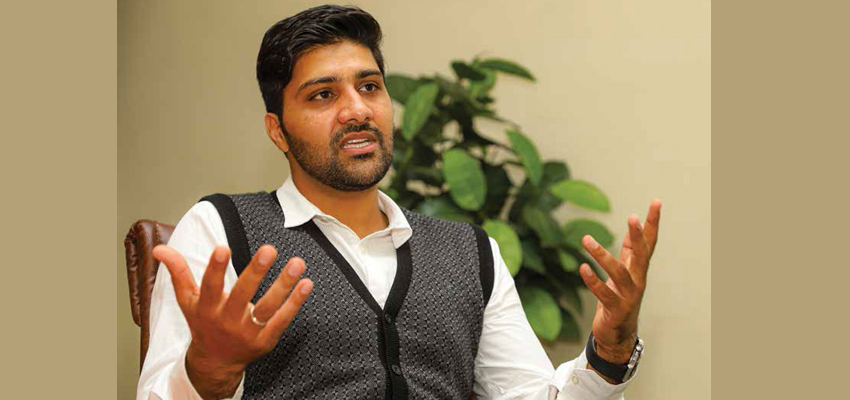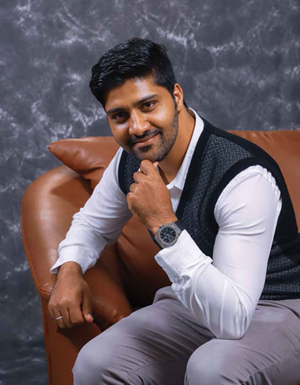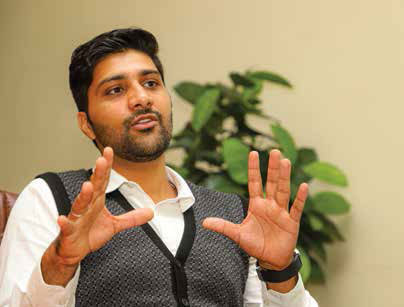Hiring leaders of tomorrow

Having over a decade of experience in creating, enabling and delivering talent acquisition programmes, Khalid Bhat, Leader Talent Acquisition, PayPal, says that the need of the hour is to be learning and re-learning, because what we learnt yesterday may become obsolete tomorrow. In order to survive in this fast-changing world where change is consistent, the key is to embrace it. In an interview with Corporate Citizen, Khalid talks about his career journey, why diversity is vital in an organization, how Artificial Intelligence (AI) is a tool that is untapped and has lots of potential which will benefit in the longer run, and how gig economy will change the way we work.

Take us through your education and career journey.
I completed my graduation in Biochemistry Honours from the University of Kashmir in 2007, post which I moved to Pune and did part time postgraduate diploma in HR from ICFAI University. The reason to come down to Pune wasn’t higher education but to earn a living. I took up a job with a small recruitment consulting setup,and I later stepped into corporate. When I look back at this over a decade journey, I feel blessed to have worked with companies like Ocwen financial, Wipro, Capita, People Strong and now PayPal. Sometimes not sticking to one company alone helps you learn the unique strategies and best practices all these companies have.
Tell us about your role as a leader, talent acquisition at PayPal.
I lead Talent Acquisition programme for the Global Customer Operations across the APAC Region. I would say my role is more of a guide and coach, to ensure we hire best in class talent for the organisation. Our definition for ‘best in class talent’ at PayPal doesn’t necessarily refer to skillset only but encompasses the key winning attributes like behaviour, attitude and cultural fit. Skillset is something which can be sharpened on the job, however, finding people who believe in your values and vision is imperative and that is a standard we have as a hiring strategy at PayPal.
When we say talent acquisition, the basic definition which one can think of would be, hiring talent for an organisation but what we do is align our function with the organisation’s values and see how one would add value to that organisation. For example, if our organisation wants to do something in the space of diversity and inclusivity, how do we as talent acquisition, collaborate with our teams to ensure that we are leading from the front and we are promoting a diverse culture?
Diversity isn’t only about gender diversity, it also consists of other aspects of diversity. For example, in the technology space, you hire the best talent from IITs but you also have to consider that there is someone out there who did not get an opportunity to join IITs or IIMs. How do we reach out to that talent and give them an opportunity? When you talk diversity in terms of economic diversity, you have to consider people with special abilities, you also have to talk about people who are good with academics but due to some problems, they couldn’t get into the college.
For example, if you talk about schools, there are some schools who do not have the facilities and the infrastructure for a person with disabilities, which in turn restrains and inhibits people to go to a college and start their career. So, how do we create an conducive environment for them so that they come in the main stream? You hire more female workforce at entry-level and you talk about your organisation is prospering with diversity but how is it translating into leadership roles down the line? Do you have career paths in your organisation which gives a conducive path to the female workforce to grow in the organisation? In our organisation, our seniors are keen on figuring out what is the kind of diversity that we are getting into the leadership ladder, and I think that is something which drives our diverse portfolio.
Second is wellness, what does an organisation do in terms of wellness of its employees? It is not only about salary. Wellness includes a lot of other aspects, you want to be an organisation who wants to be the paying master in the industry but is it sufficing the needs of the employees, is it helping them to take care of their EMIs or helping them to take care of other commitments and obligations.
Looking at the regional dynamics and understanding what are the tailored wellness programmes for an individual, not that you want to highlight it as an employer who is paying the best in the market but considering the end user who is your employee, is getting what he needs.
These are the aspects we look at, rather than restricting ourselves to the talent only, which is the qualitative parameter. It may help you to get the right talent but if you want to talk about an organisation thriving in the future, and having a substantial talent pool, you also need to talk about things which are aligned to your values, which may be wellness, which may be diversity, which may be teamwork, which may be treating your peers with courtesy, dignity and respect.
“Being relevant is the key to survival. In this era where companies are at war for talent, sometimes situations demand out of box talent attraction strategies”

What kind of challenges do you face in your role?
Every day there is a new challenge, therefore every day there is learning. Work wouldn’t be interesting if everything works seamlessly. Like any other function, our delivery effectiveness is governed by customer experience. My major customers are candidates, business and my own team. We need to ensure that we are giving best in class and effortless experience to our candidates and HMs. Effective feedback and governance mechanism helps us identify and iron out the challenges
Personally, at my level, relevancy is the most important aspect. Being relevant is the key to survival. In this era where companies are at war for talent, sometimes situations demand out of box talent attraction strategies. The business expects Talent Acquisition to come up with superior analytics to be able to take some key data driven talent related decisions. A lot of effort and hard work goes in ensuring this relevancy factor.
Other challenges could be how am I contributing to the organisation, when I say, I want to be an organisation of choice, it means that I want to be an organisation which creates beneficial environment for everybody, I want to be an organisation where I have wellness for everybody, I want to be an organisation where there are career opportunities for everybody. A challenging aspect for me is, how I create best in class talent attraction strategies to hire talent who believe in the same philosophy
“More than the technical skills, convincing skills are going to be more important in the future because the technical part will be supported by technology”
What is your take on diversity and inclusivity at work?
Diversity and inclusivity is definitely trending and most talked about subject in HR. I’m happy that most organisations have taken up this issue seriously and are coming up with conducive HR and talent attraction practices to hire diverse candidates, which is just a precursor to the main objective of inclusion. Often we get a diverse workforce but we struggle to offer an inclusive and open culture.
A lot of work needs to be done in the inclusion space vis-à-vis leaders leading from the front, on communication and awareness bit. Diversity and inclusivity sensitization work-shops, policy relook, inclusive career progression roadmap for leadership roles etc. We need to also keep in mind that diversity is not only about gender, but also it could entail religion, economic background, age, abilities and others
What do you look for in a candidate during an interview?
There are two main attributes to look at while hiring the right candidate. Technical acumen, behaviour/cultural fitment. We give 40% weight age to technical abilities (IQ) as that is something which can be learnt, however, 60% to emotional quotient (EQ) (Behavioural attributes, Cultural fitment etc.)
Do you face any challenges while dealing with millennials?
It’s more about understanding their expectations. When you talk about millennials, they want space in what they do. Millennials are more open to question the status quo. They are more into questioning and they always want to understand the reason behind some systems, and if they feel that if a system is not correct, they will raise their voice or they would not be a part of the system.
Millennials are fast and they want faster growth. They are impatient because that is the need of the hour. As an organisation, you need to create learning opportunities for them and ensure that they are getting what they want because if you are not able to offer what they expect, they will go to some other organisation.
“Millennials are fast and they want faster growth. They are impatient because that is the need of the hour. As an organisation, you need to create learning opportunities for them”
How is the industry gearing up for the next generation, Gen Z, which will be the future workforce in the near future?
The future generation will be supported with technology. Technology will aid them with transitional work and their role is going to be more of an advisor. Earlier, you were relying on an MIS analyst who would draw inferences from data, now, with the help of Big Data and AI, we have everything readymade. I think the world now is moving more towards the advisory or specialist role, rather than the generalist role. More than the technical skills, convincing skills are going to be more important in the future because the technical part is something that will be supported by technology.
In the future, it is going to be about how good one is in communication skills, convincing skills and advisory skills. What I see of the future generation, you would not see them coming to offices as we do now, the quality of infrastructure is developing day by day and we are moving towards a gig economy, where people would want to have a small workplace in their homes instead of visiting the offices
In the earlier days, people who have worked for five years or more with the same organisation are given quality profiles, this would not be the same with the next generation. What you learn yesterday is obsolete today, you have to keep unlearning and learning. Things will keep on changing. I think the future is going to be of multitasking. Today you might be in Marketing, but tomorrow you will be in HR, the next day you will be in Operations; it is going to be a mix of multitasking and mix of understanding different dimensions. The future will be more of a project-based culture as compared to full-time employment.
Will Artificial Intelligence for hiring, create a disruption?
Not really. It will actually help save the recruiters’ time. For example, I am using AI for sorting the CVs, considering that I am posting for a designation for which let’s say I am getting 10,000-20,000 responses from the candidates. What my AI will be doing is it will match the content of all CVs with that of the programmed one, and it will give me a list of 10 quality CVs. But the problem with our generation today is that people do not know how to build an apt CV, so it may happen that a well-fitting candidate who is capable, has not made a good CV according to the AI, which means he is going to be rejected by the AI.
There is a lot of work and awareness we need to create in order to capture the apt CVs without any loopholes. Another fact is that if you tamper your information AI will select me because AI does not understand whether input is authentic or not. AI might not give the right insight every time. AI is nothing but our creation, so I think we need to create more awareness and we need more time till we see the right insights, which might take ten years or so.
As Robots and AI are set to shrink the future workforce, is Human Resource Management (HRM) prepared to handle it?
Definitely, HRM is up for change. Every technology creates a market for itself, for example, when mobiles captured the market, did we say that landlines companies will be closed? No, BSNL is still there though not functioning at that scale. However, what BSNL could have done was, they could have experimented in the mobile space, which did not happen, the only take from this is, organisations need to learn, if the world is moving towards new technology, they just need to catch the bus and start embracing the change, otherwise, they will be left alone, like what happened with Nokia. I think technology will not take away jobs or businesses, crucial factor to look at is how they are going to keep up with technology.
What is the philosophy of life that you live by?
You get life only once. Happiness should be one’s main objective, which you only get by being in situations or jobs that you like to do. Money doesn’t guarantee happiness. Family and work of your choice helps you with good work life balance and the best part is both are in our own control.